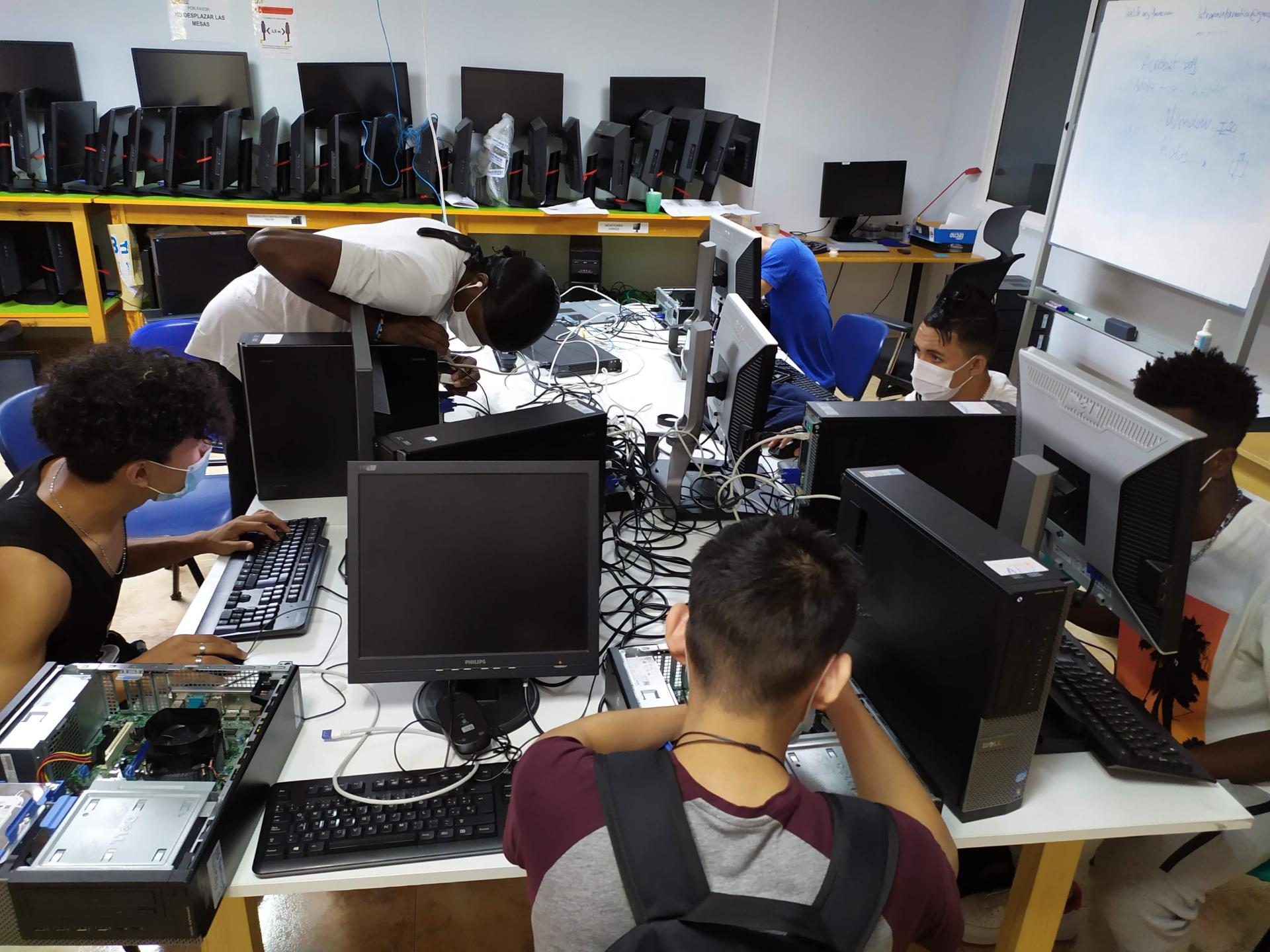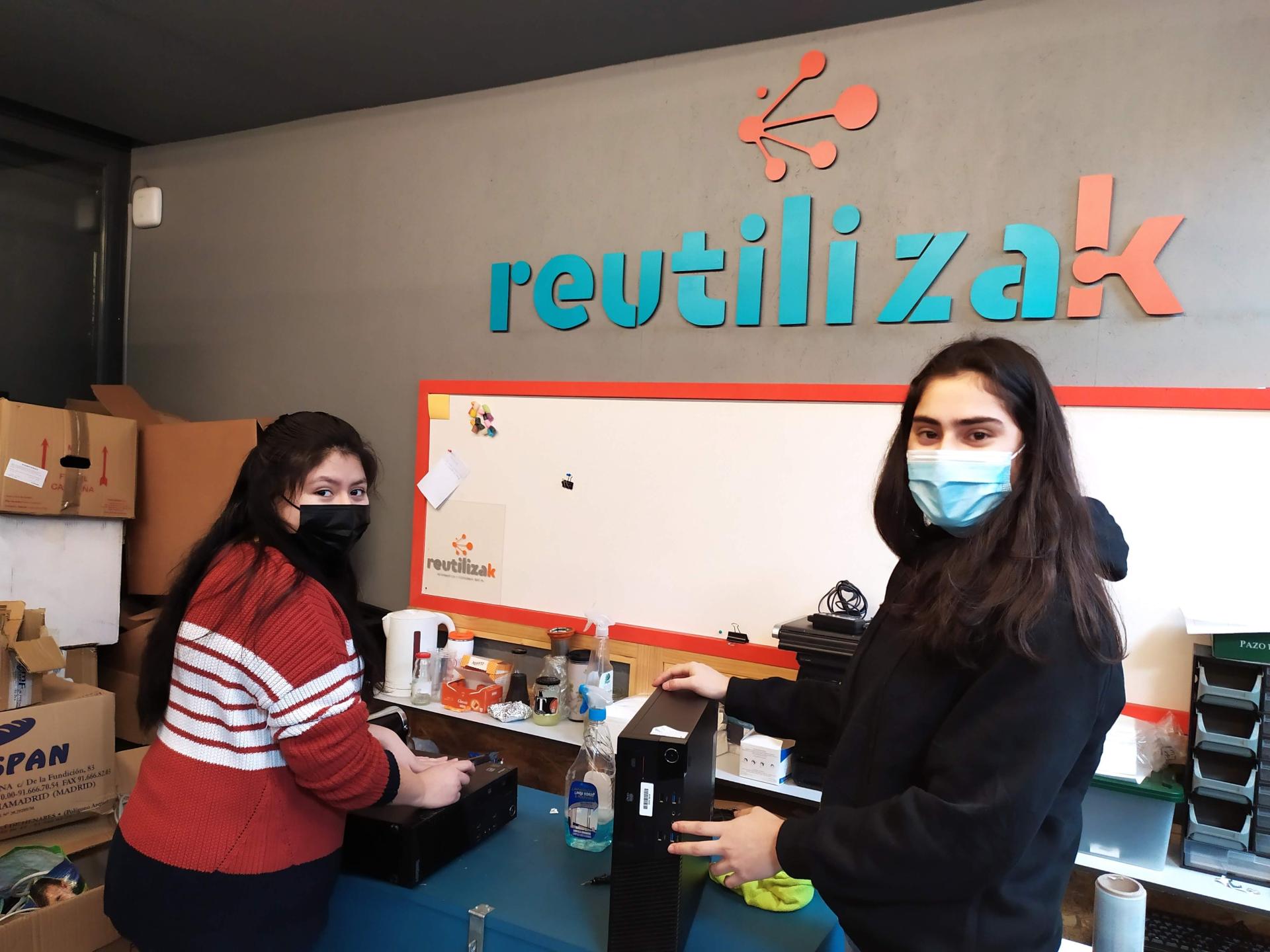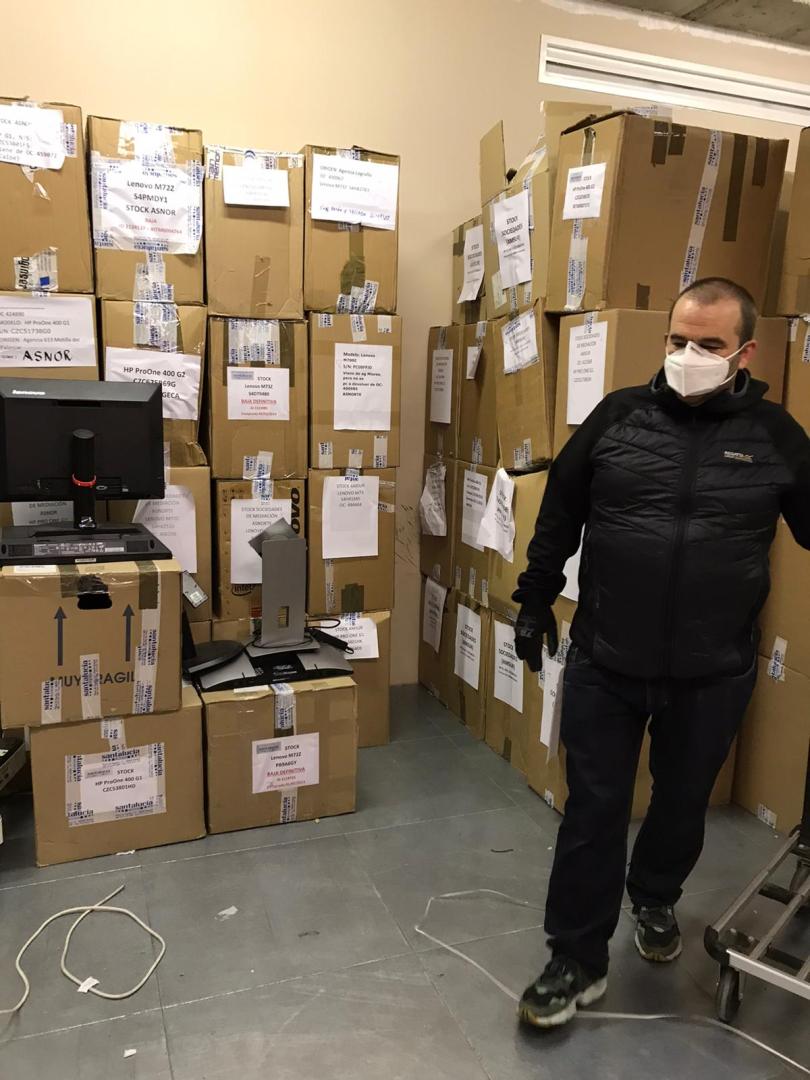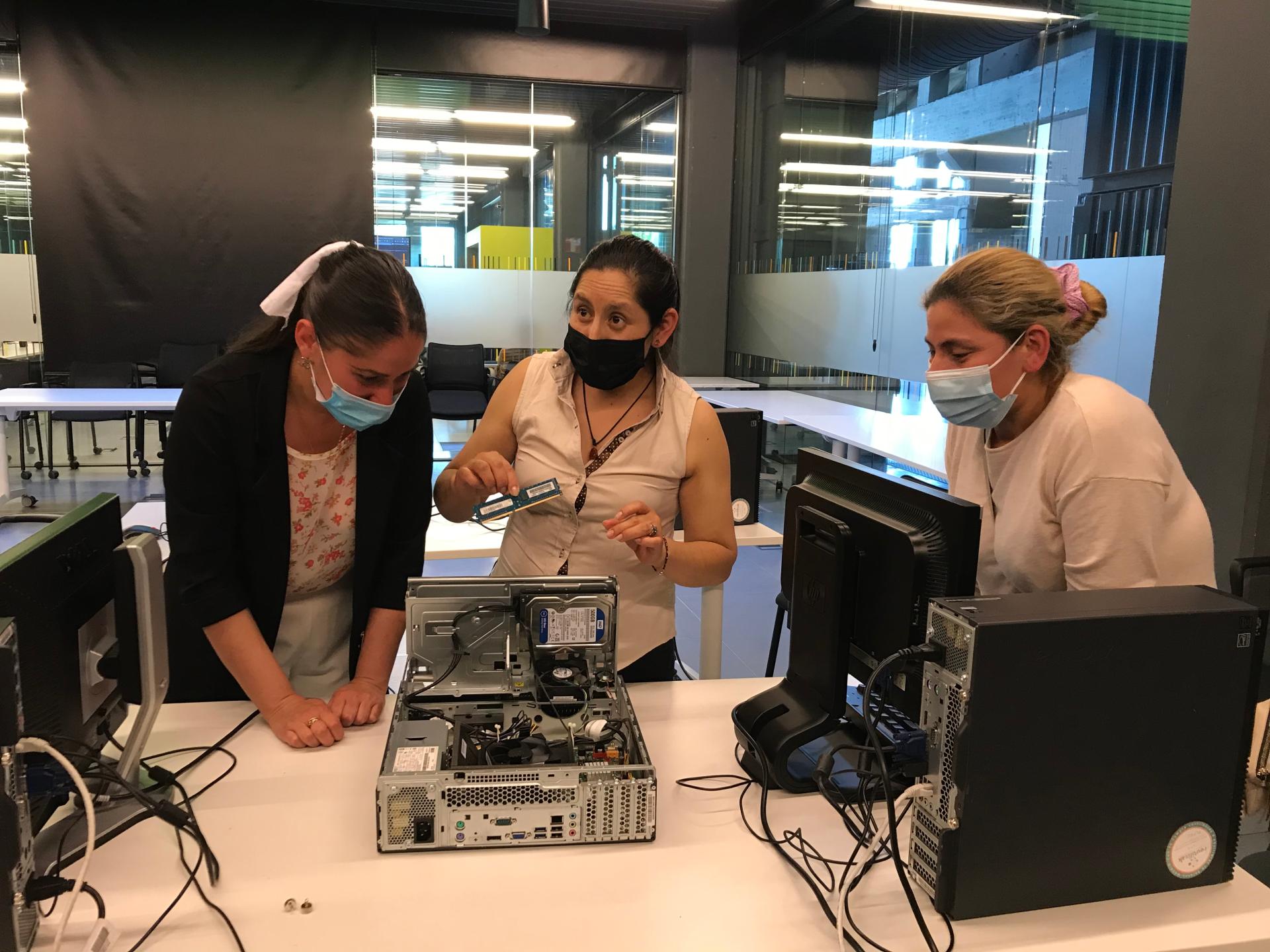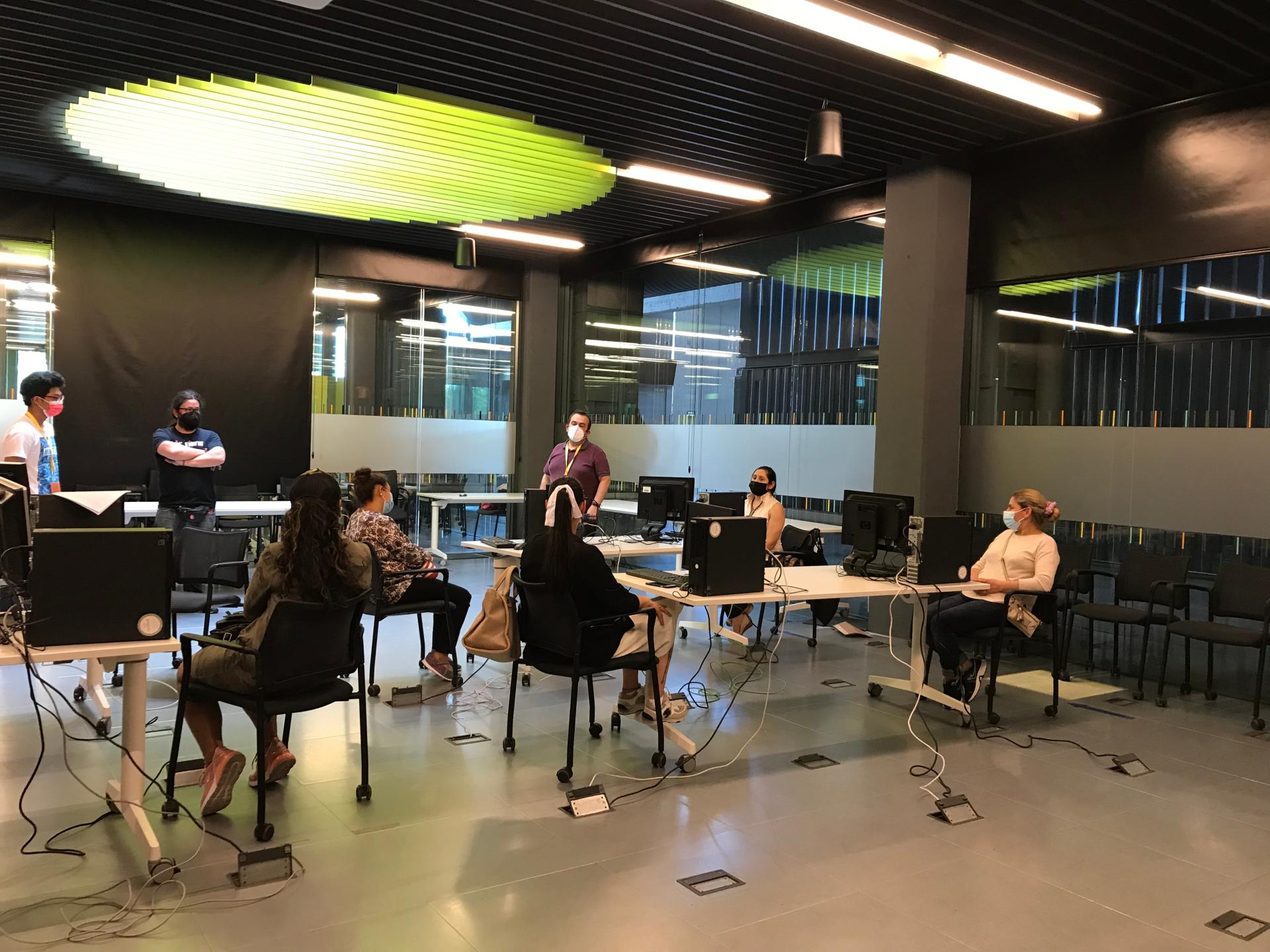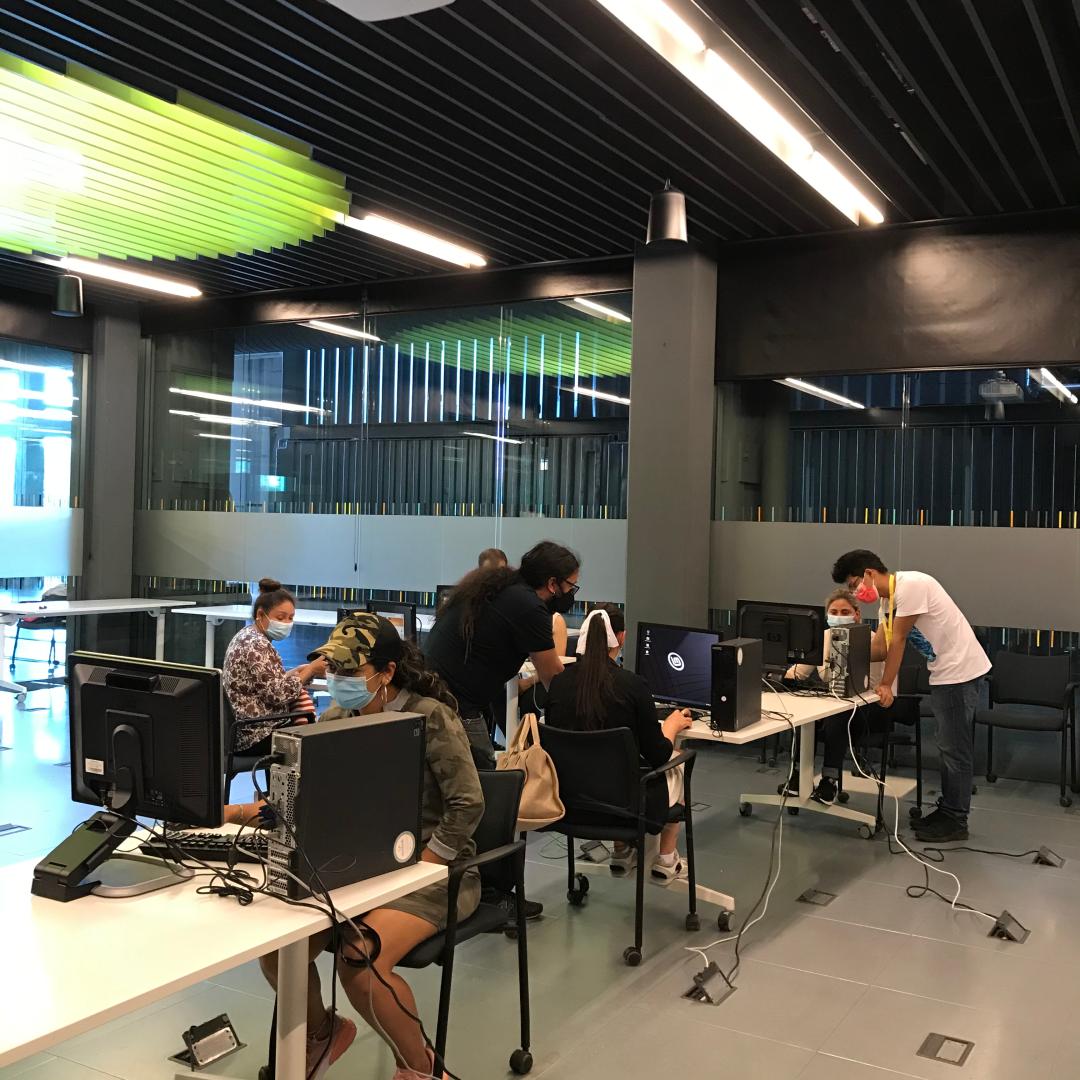ReutilizaK
Basic information
Project Title
Full project title
Category
Project Description
ReutilizaK, is a project based on circular economy principles aiming at creating networks of re-using electronic devises towards the reduction of digital divide and promoting sustainability.The project seeks to increase the digital inclusion of people living in fragile social contexts through the distribution of repaired and reused electronic devises donated by companies, and by the implementation of digital innovative trainings on ICTs.
Project Region
EU Programme or fund
Description of the project
Summary
ReutilizaK is a project created in October 2018 to adress the current social and environmental challenges related with the ecological impacts of excessive e- waste. Global electronic waste volumes grew by 21% between 2014 and 2019, according to the United Nations, a pace that will lead to a doubling of e-waste in 16 years. The world discarded 53.6 million tons of e-waste in 2019. In this context, the project aims at promoting circular economy circuits to reduce digital divide and e-waste impact, while democratising the access to ICTs.
The project created a circular network in the city of Madrid, implementing a process of donation, reparation and distribution of electronic equipments towards digital inclusion of people in fragile contexts while achieving the life- extension of electronic products. For this purpose, an online platform was created to connect with companies and individuals ready to donate electronic devices -such as desktops, laptops, tablets or mobile phones- that were going to be renovated. This material was repaired and then donated to vulnerable people, hospitals, education centres and NGOs.
After the outbreak of COVID -2019, in March 2020, ReutilizaK faced exceptional circumstances, and implemented the following actions:
- Creation of networks to transfer and distribute reused electronic devices to hospitals, vulnerable families and NGOs without an adequate digital access.
- Design of awareness campaigns to attract donations of electronic devices towards social and environmental sustainability.
- Activities to provide solutions to low-access to electronic devices and low connectivity during lockdown.
- Technical support and socio-educational support activities online for families in vulnerable contexts and digital exclusion
- Stablishing communities of shared wifi conexion
Key objectives for sustainability
Despite it is frequently considered that recycling is a priority for environmental sustainability, this practice has proved to be unsufficient to achieve a sustainable model in our societies. Given the fact that current consumption levels surpass the recycling capacity, and that products' degradation implies a high percentage of material that cannot be recycled, the real challenge for environmental sustainability and waste reduction (specifically electronic waste) requires a reduction of production and consumption. This includes actions aiming at extending the life of electronic devises following the 3 Rs rule: "Reduce - Reuse - Recycle".
In this context, the project ReutilizaK promotes an alternative way to the predominant model of consumption and waste of electronic products, implementing circular economies' circuits in the city of Madrid of re-used and recycled electronic products.
The project's objectives in terms of sustainability are:
- Promoting and fostering social and public concern upon sustainability challenges, with a critical view on the wasteful culture of electronics.
- Improving the access to ICTs through donations of recycled/reused electronic devises to vulnerable groups and providing digital trainings and internet
community iniciatives to reduce digital divide.
- Reducing electronic waste implementing circular economy circuits.
- Recovering electronic devises and equipments from companies, firms and individuals to donate.
Some of the results of 2020 can be shown in the following data:
- Donations trasnferred to other recovery nodes:
59 Laptops
800 CPUs (Barcelona)
10 tablets
6 printers
45 Mobile
Materials donated from Conécta-te network:
100 computers for families
112 computer equipment educational centers / NGOs
60 Mobiles to families
30 tablets educational centers
Donation and transfer of electronic devices:
516 CPUS
100 Monitors
27 laptop
Key objectives for aesthetics and quality
The project has included aesthetic considerations:
- The project has included in some cases decoration of the electronical devises through 2D design processes and vinyl cutter made in the project Fablabteka of the Asociación Cultural la Kalle.
- Campaigns in social media included a high quality of presentations, photographies and videos.
Key objectives for inclusion
According to a recent report published by the NGO Platform of Social Action, the access to internet and digital skills can become a key factor to improve people's well-being and guarantee the access to economic and social rights. However, the disparity in digital skills or uneven access to connectivity and electronic devises increase the social gaps. Moreover, the pandemic context of COVID-2019 with the consequent lockdowns have proved the importance of having access to internet to follow with education and labor activities in online modalities.
In this framework, ReutilizaK project increased the digital inclusion of vulnerable groups through different actions to reduce digital divide;
- Providing specific trainings focused on ICTs including internet, free-software and repairing computers;
- Implementing internet community initiatives in low-income districts of the city of Madrid;
- Distributing recycled/reused electronic devises to vulnerable population throught circular economy networks;
The project obtained the following results in 2020:
- 120 young people coming from low-income families or fragile contexts increased their digital skills;
- 30 people completed a specialized training on reparing electronic devises and microinformatics, improving their employability in the labour market;
- 1300 Cpus, 100 Monitors, 27 laptops, 112 computers transferred from companies, firms and individuals to low-income families; NGOs and education centers in Madrid and Barcelona.
- 180 mobiles and 30 tablets transferred to educational centers.
- 37 entries in ReutilizaK Website for donations and material requests; 30 entries by mail, 90 entries by WhatsApp.
- Donations after repairing workshops: 59 Laptops/ desktops, 10 tablets, 6 printers, 10 Mobiles.
Results in relation to category
ReutilizaK is presented for the "Products and life style" category because the processes implemented in the project contribute to a more sustainable and inclusive lifestyle. Nowadays computers and electronic devises in general are part of our daily life. Therefore, developing projects that contribute to extend the life of electronic products and promote the re-use and reparation of them, can be important towards a more sustainable society. Creating ciruclar economy networks that link the waste of electronic devises to reparation processes and distribution networks can be relevent to develop new models.
The project has achieved to create sustainable patterns of digital use in citizens, firms, organizations and public institutions.
The success is shown by the commitment of different organizations such as educational centers, NGOs or firms which donate material for the project and collaborate to implement a circular economy circuit which extend the use of digital devises, contributing to sustainability.
-"Camilo José Cela University"," Swiss School of Madrid", "Merger Agency Spain, "Neinor Homes", "The Leading Residential Group", Grupo Isolux EPC, SL, PackLink, Media Markt Companies , Grupo Albión Communication Advisors, SEWAN, Invibes Spain S.L, e-sort.net, MARLYS LARES , Cubico Sustainable Investments , Miguel Hernández Public School (Getafe), Secondary School of Joaquín Rodríguez (Vicalvaro), Secondary School of IES Architect Pedro Gumiel (Coslada), Asociación Krecer, Asociación Educación Cultura y Solidaridad (ECyS), Recumadrid , Rivas-Sahe, Fundación Adsis, Federación Regional de Asociaciones de Vecinos de Madrid, Fundación Splai.
Impacts can also be measured by the Social Networks (Facebook, Twitter, Instagram): 1325 pages (average) visited monthly along 2020; 22 retweets monthly (average); 415 Facebook "likes" montly; 11.000 impressions montly (average).+ 137 website entries for donations and material requests; 90 entries by Whatsup.
How Citizens benefit
The "Asociación Cultural La Kalle" is a non-profit civil association that was launched in 1986, in order to develop a socio-educational programs for young people in social disadvantage. Our long-extended experience has led us to collaborate and create sinergies with other civil society organisations. Thus, we are parners with the European Anti Poverty Network (EAPN), and member of INJUCAM Federation for the promotion of childhood and youth.
ReutilizaK project has the support of the MARES project. We are working in networking with Vortex Dimension, http://www.dimensionvortex.com/ Recumadrid http://www.recumadrid.es/ and with the collaboration of the Dreamit Foundation-www.ongdreamit.org.; Fundación Reas Dreams https://donalo.org/.
We are also accompanying entities interested in working on technological reuse, sharing learning and services such as La Rueca, Laptop Breakdown and other social initiatives.To enable a complete circular economy process in ReutilizaK project, different actors are required:
-Donors: partner organizations and companies that donate computer equipments for their social corporate responsability policies are actively participating in the project. Examples of companies we have signed collaboration agreements are: Hogan lovells, Watson Farley, Vass, IBM, SEUR. Other agreements are made with companies that have headquarters at the national level to reinforce the networking as we are member of the national Federation of ereuse.org:
SARIA BIO-INDUSTRIES ESPAÑA SL
Siemens
Madrid Metro
-Socially disadvantaged young poeple who receive microinformatics, computer reparation and ICTs trainings: this group is actively involved in the training process, through a participatory methodology and frequently presenting proposals, and periodic evaluation questionnaires.
-Recipients of reused digital equipment such as non-profit organizations, educational centers or individuals are actively involved along the project.
Innovative character
The innovative aspects of the project are those described below:
-Alternative socio-labor insertion of socially disadvantaged youth from an innovated sector as ICTs.
-Comprehensive circularity networks, guaranteeing the Reduction of consumption, based on the reduction of waste, derived from reuse that allows to extend the useful life of the devices, until they are finally recycled according to regulations.
-We integrate 3 key elements of environmental sustainability, Reduce, Reuse and Recycle (The 3Rs) and in this adequate order to be really efficient.
- Professionalized response to the organizations and individuals needs with low resources, in terms of ICTs.
- Contributing to digital inclusion, from the social and solidarity economy.
- Measurable social and environmental impact through objective indicators, thanks to a comprehensive model and a proven traceability of the distributed products from donation to the end of its useful life, once reused. Traceability control is very important for this project, to assure the durability of the digital products.
- Innovative service strategy that generates a reliable initiative with guarantees (Agreements,certificates, traceability) as an alternative to non-transparent circuits for the reuse or premature recycling of devices, non-existant in Madrid.
- Promotion of a business models around ICTs, based on the philosophy of Free software and Corporal Social Environmental Responsibility Policies.
- Platforms available to give access to electronic devices to respond to the needs of the current market, using the following platforms:
Sempiterna.red; tossall.org; getafereutiliza.lymagetafe.es/; Donalo.org.
- Softwares to help with device inventories (desktop, laptop, netbook, and server): EReuse.org Workbench PXE server.

